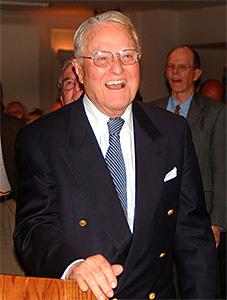Remembering “Shriverized” and Shriver
In the Peace Corps world of the early Sixties, the noun “Shriverized” meant “to enlarge, to speed up, to apply greater imagination.” As an English major I had never heard of the word, but in the linqua franca world of the new Peace Corps, this ‘noun’ changed my life.
I had come of age with the Presidency of John F. Kennedy, and was a small part of the New Frontier as a PCV. I was ‘Shriverized” by the man himself, R. Sargent Shriver.
It was as a Trainee for the Peace Corps in Washington, D.C., in the summer of 1962, when I first met President Kennedy, and when I first met Sargent Shriver. I was a “Kennedy’s Kid’ and, yes, I was, like hundreds, and then thousands, of others going to change the world forever in the New Frontier. And, yes, we really, really believed we would.
We believed because we believed in Sarge Shriver. He was our Pied Piper, our hero, our connection to Kennedy and the New Frontier. And we loved the man.
There would never have been a Peace Corps if there hadn’t been Shriver. He took an idea half conceived by Jack Kennedy late at night in an impromptu campaign speech on the campus of the University of Michigan and developed it into an agency that Time Magazine would call in 1963 the single greatest achievement of the new administration.
Kennedy had caught a wave that young people wanted to be involved in the world, and Shriver, the brother-in-law in the family, was given the task of, as Kennedy would say when signing the bill into law, of taking a lemon and turning it into lemonade.
The great, and continual success of the Peace Corps, is that as an American government agency it is not part of the foreign policy of the American government. That was Shriver’s real genius, and that was not President Kennedy’s idea. In the first days of his new administration Kennedy wanted a smoothly run foreign policy with all the agencies neatly tucked together within the State Department.
Then when Shriver, in the wintery days of ’61, got a telephone call from Warren Wiggins while traveling in India, he realized that the new foreign policy plan, crafted by John Kenneth Galbraith, Henry Labouisse, and Lincoln Gordon, had the Peace Corps buried in the backwaters of a new super-foreign-aid agency, and he balked.
While its placement might make sense on a foreign aid flip-chart, Shriver knew it was a death blow for the Peace Corps.
With the help of Bill Moyers, Shriver went to work in the back rooms of the White House. Bill Moyers got Vice President Johnson to lobby Kennedy into letting the Peace Corps have its freedom, but it was with a price.
According to Harris Wofford in his 1980 book, Of Kennedys and Kings, Jack Kennedy told Shriver’s wife, Eunice, in words similar to these, “if Sarge doesn’t want me to have it in AID where I wanted it—let him go ahead and put the son-of-a-bitch (Peace Corps) through Congress on his own.”
Meanwhile, Lyndon Johnson would whisper to Bill Moyers, “Don’t sell the Peace Corps, sell Shriver.”
And that is exactly what Moyers did. He and Shriver sold the idea of a Peace Corps day-by-day in the hallways and offices of Capitol Hill.
One member of Congress, a member of the House Rules Committee, remembered Shriver from that time. “One night I was leaving about seven-thirty and there was Shriver walking up and down the empty hallway of our building, glancing into open doorways to see if anyone was still working. I invited him into my office and he started talking to me about this new Peace Corps. I didn’t like the program but I was sold on Shriver—I voted for him.”
We all voted for Shriver, then and now.
In these days of rancor in the hallways of Congress — and on the presidential campaign trail — we might all do better if we had more legislators and government officials, and just common folks, who wore their hearts on their sleeves, as Sarge always did, and who knew how to Shriverize an idea whose time has come.

Will you please add a byline for the writer of this article?
Since nobody else has answered your question, I’ll try. This article was posted by John Coyne, and in the absence of an attribution entry I assume the author is John himself. Also events mentioned in the article fit his life as far as I can tell.